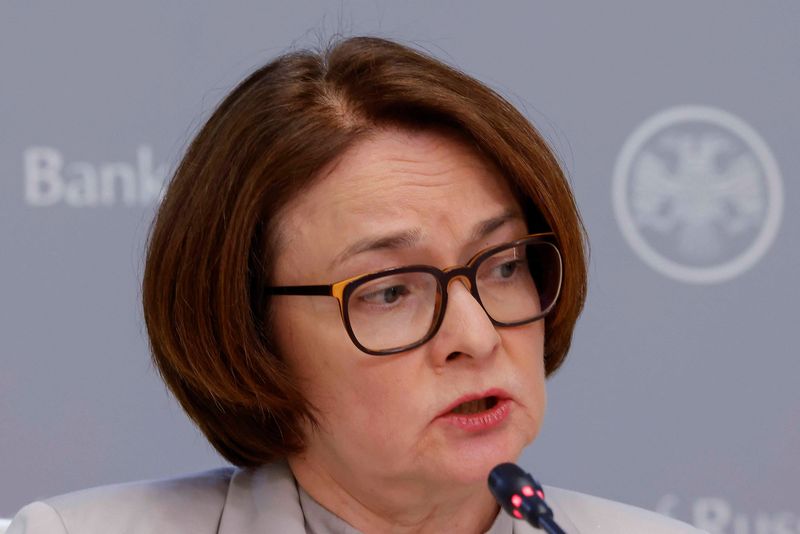MOSCOW (Reuters) -Russian Central Bank Governor Elvira Nabiullina and her deputy Alexei Zabotkin addressed a press conference on Friday after the central bank raised its key rate to 18%.
Nabiullina and Zabotkin spoke in Russian. The quotes below were translated into English by Reuters.
NABIULLINA ON RATE DECISION
"The absolute majority of the discussion participants were in favour of raising the rate to 18%, but there were also suggestions to keep the current rate level at 16%...there were also were proposals to raise the rate to 19%, to 20%."
"We assumed that for inflation to return to the target, taking into account a 16% rate, simply more time is needed for the tightness of monetary conditions to show a decline in inflation, taking into account the lag."
"We decided to raise (the rate) to 18%, but, as I have already said, we do not rule out further increases. Our further steps will depend on incoming data."
ZABOTKIN ON RATE DECISION
"I would urge you to pay attention not only and not so much to the change in rate here and now from 16% to 18%, but to the change in forecast trajectory of the rate. The average (expected) rate for next year. If you look at the centre of the range, is up from 11% to 15%, for 2025, it's up from 6.5% to 10.5%. Both are a change of not two percentage points, but four percentage points. And that's what gives additional rigour to today's decision."
NABIULLINA ON DUTIES
"...An increase in duties is always pro-inflationary, almost always a pro-inflationary factor, but we think that the effects of the current decision will be limited because they will not affected a very large group of goods, the market basket, up to 7%, if I am not mistaken. So we think that these effects are limited."
NABIULLINA ON CHINA'S CENTRAL BANK
"We are also watching the situation in China, of course, not only the central bank's policy, (but) what is happening with the development of the economy, this is our key trading partner."
"As for their rate decision, they have a different monetary policy regime. Furthermore, their problem is not high inflation, but low inflation. China is now balancing around zero inflation, they are pursuing a policy diametrically opposed to ours, because our task is to reduce inflation, while their task is to avert deflation."
NABIULLINA ON SHARP RATE HIKES
"There are two sides to this coin, to this rate hike. We can achieve a halt in inflation and even provoke deflation with a prohibitive rate level, but the result will not be the economy's return to sustainable, balanced growth, but an excessive cooling of demand with excessive volatility in all parameters - in interest rates, in output, in employment, and a strong deviation of inflation downwards from the target."
"And such excessive volatility will have negative consequences for economic development. So we have no need for these kind of shock increases."
NABIULLINA ON THE PUBLICATION OF OVER-THE-COUNTER TRANSACTION VOLUMES
"Regarding the publication of data, indeed, we started publishing in April, then we stopped publishing because we see the risks of secondary sanctions. We do not link the realised sanctions with the publication, but nevertheless, in order to reduce these risks, we have taken this decision, and no changes are expected here for the time being."
NABIULLINA ON THE ECONOMY OVERHEATING
"As for the overheating, yes, we do believe that the economy is overheating...We do not give a quantitative assessment of the scale of overheating, because it is still such an unobservable value, but the inflationary dynamics are a very important indicator of the overheating of the economy."
"Therefore, our monetary policy is aimed at narrowing this output gap so that the economy moves to a balanced growth rate."
NABIULLINA ON OPERATIONS WITHIN THE BUDGET RULE
"We can conduct them both on the stock exchange and in the over-the-counter (OTC) market. The exchange rate will not be affected in any way. If the risks (the termination of exchange trading in yuan) are realised, we will explain the specific mechanism. But I can say that we are ready to conduct it on the OTC market as well."
NABIULLINA ON CROSS-BORDER PAYMENTS
"As far as cross-border payments are concerned, of course, we are considering different risk scenarios and preparing for different situations."
"But in general, I think that companies will solve payment problems one way or another, because many countries need to trade with Russia, to carry out export and import operations. So there will be ways to make payments."
"We take into account the fact that transaction costs of companies in this situation may grow."
* "We see problems in cross-border payments, in the use of foreign currencies, the risk of secondary sanctions. But we are not - I have said it many times - ready to comment specifically on detailed mechanisms, ways to solve the problem of cross-border payments."
ZABOTKIN ON INFLATION
In terms of the overall pattern of sustained price increases, the peak was in the third quarter of last year, in the autumn, actually, from September to November. Then there was a slowdown in the first quarter. They increased slightly in the second quarter. July, in all likelihood, will also be quite substantial, high monthly prices..."
"But further, during the second half of the year, we believe that the current rates of price growth will be significantly lower than they were on average in the first half of the year. And in fact this is included in the forecast."
* NABIULLINA ON LABOUR MARKET DEFICIT

"...The deficit in the labour market is increasing. The latest surveys of companies show that already 72% of companies consider labour shortages to be their main constraint."
"Migration flows, of course, have an impact on the level of tension in the labour market, and we take this into account."